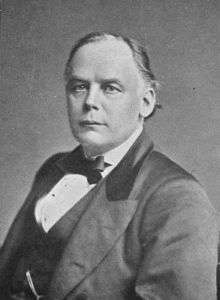Irreligion in the United Kingdom
Irreligion in the United Kingdom refers to the lack of belief in religion, secularity or atheism in the country. Historically, the growth of irreligion in the UK has followed a European-wide pattern of secularisation.[2]
The first British census to gather data on religion, in 2001, showed that there were 7.7 million irreligious people in the country. The wording of the question was criticised by humanist groups, and a revised question in the next census in 2011 counted 14.1 million irreligious people. This made irreligion the second-largest viewpoint on religion after Christianity, larger than the combined populations of non-Christian religions in the UK, and also the largest growth between the two censuses.
Freedom to be irreligious had been limited by the country's blasphemy law, which punished criticism and mockery of Christianity, particularly the state Church of England. The last sentencing for the crime was in 1921, with the law being formally abolished in 2008.
1700–1850
Organized activism for irreligion in the United Kingdom derived its roots from the legacy of British nonconformists. The South Place Religious Society, which would later become associated with the Ethical movement, was founded in 1793 as an organization of Philadelphians or Universalists.
The Oracle of Reason, the first avowedly-atheist periodical publication in British history, was published from 1841 to 1843 by Charles Southwell. It suffered from numerous imprisonments of its staff, including Southwell, George Holyoake and Thomas Paterson, for missives deemed "blasphemous" by the authorities (Holyoake was the last person in Britain convicted of blasphemy in a public lecture). Holyoake took to publishing The Movement (1842-1845) following his six-month sentence, which later became The Reasoner (1845-1860) and shifted to a larger focus on social issues facing the British working class, increasing the publication's readership. It was during this time that Holyoake developed his idea for the replacement of Christianity with an ethical system based upon science and reason, terming his proposal "secularism".[3]
1850–1900

George Holyoake's coining of the word secularism in 1851 offered the English-speaking world the clarification of the nascent movement for separation of religion and state. The National Secular Society, founded in 1866 by politician Charles Bradlaugh, spearheaded the advocacy for freeing citizens from absolute government requirements involving religious observances; the Leicester Secular Society was founded in 1851. Bradlaugh's 1880 election to Parliament brought on a decade-long dispute over the demanded right to affirm declarations of office rather than swear oaths, as he was denied his seat for five years by a ruling that he had no right to affirm and resolutions preventing him from swearing an oath. When Bradlaugh was ultimately admitted in 1886, he took up the issue and saw the Oaths Act 1888 passed, which confirmed the right to optionally affirm declarations for inaugurations to office and offering testimony to government bodies.[4]
In 1881, The Freethinker began circulation as Britain's longest-running humanist periodical. In 1891, the Union of Ethical Societies was formed in the United Kingdom by American Stanton Coit as a union of British Ethical movement societies; this group would later become known as the Ethical Union and the British Humanist Association.[5] In 1899, the Rational Press Association was formed by a group of free-thinkers including Charles Albert Watts and George Holyoake.
Meanwhile, the South Place Religious Society became further aligned with organized secularist advocacy during the tenure of Moncure D. Conway as minister of the congregation; Conway, an American Unitarian minister who served from 1864–1885 and 1892–1897, moved the congregation further away from doctrinal Unitarianism, and spent the break in his tenure (during which Stanton Coit served in his stead) writing a biography of American revolutionary ideologue Thomas Paine. In 1888, the South Place Religious Society became the South Place Ethical Society, now known as the Conway Hall Ethical Society.
20th century

The 1960s were a significant time for irreligion, as the Ethical Union rebranded as the British Humanist Association, which went on to co-found the International Humanist and Ethical Union and create a symbol for humanism, the Happy Human.[5] Broadcasters such as Margaret K. Knight sensationalised Britain with open advocacy of non-religious values and secular education.[6] Senior figures in the British humanist movement went out to take on leading roles in institutions such as UNESCO, the World Health Organisation, and the Food and Agriculture Organisation.[7]
John William Gott, a working man of Bradford, West Yorkshire, attacked religion, especially Christianity, seeing it as reducing the opportunity for a socialist revolution. His lectures on rationalism and scepticism, and anti-Christian pamphlets, saw him jailed for blasphemy in 1911. Liberal Prime Minister H. H. Asquith was one of a group of Members of Parliament who proposed an ultimately unsuccessful piece of legislation to abolish blasphemy offences. Gott was jailed again ten years later for a pamphlet showing Jesus as a clown, and died in 1922 soon after his nine-month sentence which included hard labour despite his worsening physical condition. There was a public backlash against his sentence.[8]
Gott was the last Briton jailed for blasphemy, but the offence remained a technical crime through common law until being abolished in the Criminal Justice and Immigration Act 2008.
Evolutionary biologist Richard Dawkins, who first came to prominence in 1976 following the release of The Selfish Gene, increasingly figured in British irreligion with the release of his 1986 work The Blind Watchmaker, in which he argued in favour of evolutionary natural selection as opposed to intelligent design and creationism.
21st century

In the 21st century, New Atheism became a popular topic of debate, support and critique in the United Kingdom. Dawkins' 2006 book The God Delusion and Christopher Hitchens' 2007 book God Is Not Great were considered emblematic works of the era among British authors, and Dawkins advocated for the Brights movement.[9] The Atheist Bus Campaign was inaugurated during this time, in which advertisements on double-decker buses were purchased by the British Humanist Association in order to advocate non-belief in the supernatural; the campaign caused controversy and complaints to authorities, but soon spread to other countries and continents, taking root in the United States as a variety of atheist billboard campaigns.[10] Atheism is expected to be the dominant position on the existence of God by 2038.[11] A 2009 survey of 1,000 teenagers aged 13 to 18 reports that two-thirds of British teenagers do not believe in God.[12]
The rise in irreligion was confirmed in the UK's 2011 census, which saw irreligion rise from 7.7 million in 2001 to 14.1 million, a rise of 10.3 percentage points. The local authority with the highest level of irreligion was Norwich, the county town of Norfolk, where the level was 42.5%.[13] Religion has the least influence on youth.[14] According to the 2011 census, 25% of England has no religion, 7% of Northern Ireland,[15] 37% in Scotland,[16] and one-third of Wales.[17]
According to YouGov, Christianity is perceived to be on the decline.[18][19] Mori Polls have shown that British Christians support a secular state.[20][21][22] Britons are amongst the most skeptical about religion.[23]
Irreligious British politicians
Clement Attlee, Prime Minister for the Labour Party from 1945 to 1951, rejected organised religion and claims of the supernatural his whole life, despite growing up in a Christian household.[24] James Callaghan, also of Labour, was Prime Minister from 1976 to 1979. He left the Baptist Church as a young man when he became more involved in politics.[25]
Contemporary British atheist politicians include Ken Livingstone of Labour, who was London's first mayor between 2000 and 2008. He left Christianity at the age of 11.[26] Ed Miliband, a former leader of the Labour Party from 2010 to 2015, is also an atheist.[27] Over 100 Parliamentarians in the UK are members of the All Party Parliamentary Humanist Group, which means the non-religious have substantial representation among MPs and Lords.[28]
See also
References
- ↑ Philby, Charlotte (12 December 2012). "Less religious and more ethnically diverse: Census reveals a picture of Britain today". The Independent. London.
- ↑ Lilla, Mark (2006-03-31). "Europe and the legend of secularization". The New York Times. Retrieved 2012-08-12.
- ↑ "George Holyoake : Biography". Spartacus.schoolnet.co.uk. Retrieved 2012-08-09.
- ↑ Religion and Mental Health - Google Books. Books.google.co.uk. Retrieved 2012-08-09.
- 1 2 "Our History since 1896". Retrieved 2 November 2013.
- ↑ "Margaret Knight". Retrieved 13 May 2016.
- ↑ Pollock, David. david-pollock.org.uk http://david-pollock.org.uk/welcome/humanism/humanism-beliefs-and-values/. Retrieved 13 May 2016. Missing or empty
|title=(help) - ↑ "John Gott". Oxforddnb.com. Retrieved 2013-08-18.
- ↑ James Wood (2011-08-26). "The New Atheism | Books". London: The Guardian. Retrieved 2012-08-09.
- ↑ Andrew Brown (2012-04-26). "The persistence of superstition in an irreligious Britain | Andrew Brown | Comment is free | guardian.co.uk". London: Guardian. Retrieved 2012-08-09.
- ↑ Webb&, Al. "Atheists likely to outnumber Christians in England in 20 years". Washington Post. Retrieved 2012-08-09.
- ↑ 22 Jun 2009 (2009-06-22). "Two thirds of teenagers don't believe in God". London: The Daily Telegraph. Retrieved 2012-08-09.
- ↑ Steve Doughty (2012-12-13). "Census 2011 religion data reveal there are 4m fewer Christians and 1 in 4 is now an atheist | Mail Online". London: Dailymail.co.uk. Retrieved 2013-08-18.
- ↑ "British Youth reject Religion". Yougov.co.uk. Retrieved 2013-08-18.
- ↑ Devenport, Mark (2012-12-11). "BBC News - Census figures: NI Protestant population continuing to decline". Bbc.co.uk. Retrieved 2013-09-28.
- ↑ "Census reveals huge rise in number of non-religious Scots". Herald Scotland. Retrieved 2013-09-28.
- ↑ "BBC News - Census 2011: One third in Wales have no religion". Bbc.co.uk. 2012-12-11. Retrieved 2013-09-28.
- ↑ "Hard evidence: is Christianity dying in Britain?". Theconversation.com. Retrieved 2013-11-27.
- ↑ "Secularism in Britain". YouGov. Retrieved 2013-09-06.
- ↑ "Religious and Scoial Attitudes of UK Christians in 2011" (PDF). C3414097.r97.cf0.rackcdn.com. Retrieved 2013-09-28.
- ↑ "Christians don't want religion to 'influence public life'". London: Telegraph. 2012-02-14. Retrieved 2013-09-28.
- ↑ "Ye of little faith". Prospect Magazine. Retrieved 2015-02-17.
- ↑ "UK among most sceptical in world about religion". The Daily Telegraph. London. 2014-04-17.
- ↑ "The politics of faith | Nick Spencer | Comment is free". London: theguardian.com. 2010-05-05. Retrieved 2013-08-18.
- ↑ "James Callaghan". Infobritain.co.uk. Retrieved 2013-08-18.
- ↑ "Ken Livingstone interview". Somethingjewish.co.uk. 2005-11-17. Retrieved 2013-08-18.
- ↑ "Ed Miliband: I don't believe in God". London: Telegraph. 2010-09-29. Retrieved 2013-08-18.
- ↑ "Humanists in Parliament". British Humanist Association. British Humanist Association. Retrieved 9 July 2015.
